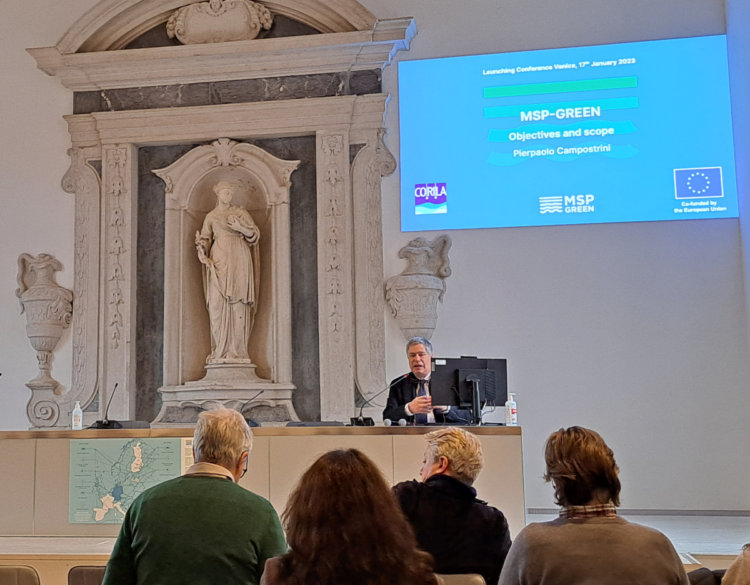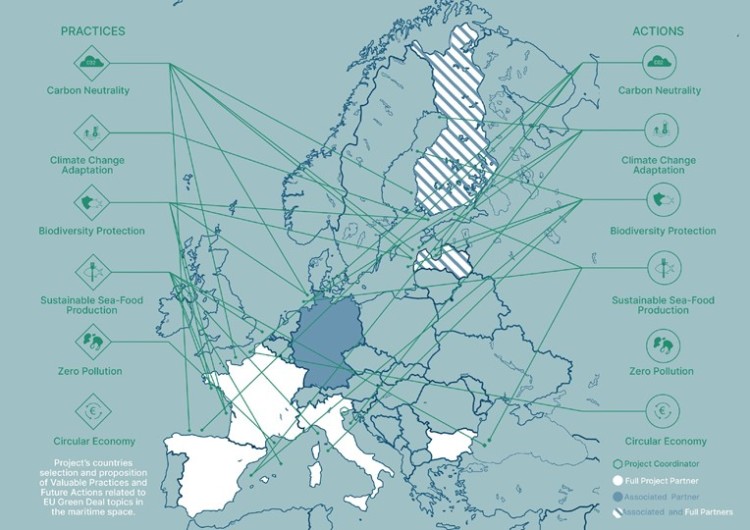MSP-GREEN supports maritime spatial planning on the road to achieving the objectives of the European Green Deal
Finland’s maritime spatial planning authorities are involved in the international MSP-GREEN project (2022–2024) to promote the green transition in marine areas. Maritime spatial planning focuses on the most important aspects of the European Green Deal from the perspectives of a sustainable marine environment and the blue economy. These aspects are climate change mitigation and adaptation, marine energy production, the blue circular economy, marine biodiversity, sustainable food production and the prevention of marine pollution. The project covers all the sea areas in the European Union, enabling unprecedented cooperation in maritime spatial planning throughout Europe.
A launching seminar was held for the project in Venice in January 2023 to present the project’s activities and objectives to a wider audience. Speakers from various fields were invited to examine the transition of maritime activities towards an ecologically, economically and socially sustainable future.
“One of the objectives of the European Green Deal is to enable a fair transition that accounts for the needs of different actors and regions. Reconciling several activities in marine areas requires a wide-ranging approach that transcends sectoral boundaries,” says Vesa Arki, Project Planner on the MSP-GREEN project.

Pictured: Project Coordinator Pierpaolo Campostrini presents the project’s contents and objectives.
Attendees at the launching seminar workshop discussed proven good practices in maritime spatial planning under four thematic topics: biodiversity and ecosystems, sustainable marine food production, climate change mitigation and adaptation, and the circular economy and sea pollution. Sharing national experiences and practices is the first step towards the project’s objective of identifying the means for maritime spatial planning to further contribute to the future sustainable use of marine areas. Universally applicable planning recommendations are derived with the help of shared experiences, learning from partners, and evaluating the transferability of best practices.
One good practice was scenario work in maritime spatial planning: Finland described its approach of preparing three potential visions of Finland’s sea areas in the future. During the project planning phase, two other good practices were identified from Finland’s first round of maritime spatial planning (2017–2021): identifying potential areas for the development of offshore wind power and ecologically significant underwater marine habitats (EMMA). Read more about the scenario work here: https://www.merialuesuunnittelu.fi/en/future-scenarios/

The best practices and new actions on the MSP-GREEN project focus on entities covered by the European Green Deal, which are relevant for maritime spatial planning. The project is led by Italy, and the partner countries are Finland, Spain, France, Bulgaria and Latvia. In addition, Germany and VASAB are associated members.
In addition to good practices, the workshop highlighted areas for development. The MSP-GREEN project has identified areas for development in each country and will seek solutions through new actions. Finland provides two actions. The first is to examine the impacts of climate change on marine biodiversity by identifying areas sensitive to changes and stable areas, among others. The work will be done in cooperation with the Finnish Environment Institute. The second action is to examine multi-functional marine areas (the MariPark concept) in collaboration with the eMSP NBSR project. The activities under analysis include fish farming, seaweed and shellfish farming, fishing, offshore wind power, tourism and leisure activities. Both actions involve bringing together the main actors to discuss the theme and its importance for maritime spatial planning. Events will be held in autumn 2023 and early 2024.
“The launching seminar reinforced the understanding that maritime spatial planning must address different themes and challenges in different sea areas. The characteristics of the areas and different approaches to maritime spatial planning give rise to an interesting comparison between countries. I look forward to seeing how we will integrate good practices into Finnish maritime spatial planning and what universal recommendations applicable by all member states we will identify as the project progresses,” Arki says.
In addition to pan-European and national analyses, the project endeavours to further strengthen networks of actors within each sea area. When the project comes to an end in autumn 2024, workshops will be held in each sea area to discuss the recommendations that were developed. The objectives are to examine the recommendations from the standpoint of each sea area and identify the main thematic areas, priorities and other important initiatives and strategies in the region.
The MSP-GREEN project is funded by the European Maritime, Fisheries and Aquaculture Fund and will run from November 2022 to October 2024.
Project website: https://mspgreen.eu/
Twitter: @MSPGREEN22

